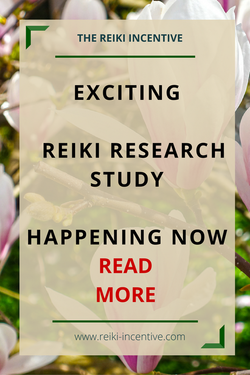
I was really interested to read recently about what seems to be a very large observational study which is currently being conducted by the Centre for Reiki Research in the US. The purpose of the study is to measure the effectiveness of Reiki sessions in terms of their effect on:
The study began in March 2015 and to date, there are 82 Reiki practitioners involved, all members of the Reiki Membership Association. From what I can understand from the Center for Reiki Research website, it would seem that Reiki recipients are recruited into the study directly by each Reiki practitioner at his or her practice. Both before and after their Reiki sessions, those who participate answer some questions about their symptoms and how they feel, anonymously, by completing an online questionnaire. This practice mirrors some of the larger observational studies I have seen conducted in the health service here in the UK. Part of the data collection involves participants completing a list of questions which make up the PANAS Schedule (Positive and Negative Affect Schedule). This is what is known as a “validated” outcome measure. This means that it has been shown to accurately capture valid information about positive and negative moods. It would seem that the research has had formal independent ethical approval, via Harvard University. As well as being a sign that the research is ethical this usually indicates that it is also likely to be well designed. Many ethics committees will view poorly designed research as unethical. So far, data from over 1200 sessions has been recorded. The study is aiming to gather information from 2000 sessions in total. It is anticipated that the research will be completed some time in early 2017 after which the data will be analysed by PhD qualified Reiki researchers. In March this year, a preliminary analysis of the available data indicated positive results on all the outcomes measured. These positive results were shown to be “statistically significant” which means that the positive results shown in the data were unlikely to be as a result of chance. Great eh! The Center for Reiki Research states: “The results of the study will demonstrate in what way and to what extent Reiki is helpful in the categories studied. This information will be available to practitioners to guide their use of Reiki. It could also be used in the design of future Reiki studies.” It is certainly an exciting study. Its size is a particular strength, as is the fact that some of the data being collected is via the use of a known and validated outcome measure. The anonymous collection of data should help reduce any bias in the results which might have been created by the recipient wishing to please their practitioner. The next step for this research will be for the researchers to thoroughly analyse the data and prepare a report for publication in a reputable “peer reviewed” journal. “Peer review” simply refers to the process that new research papers go through. A written report will be circulated to one or two research experts for comment and questions before the final version is accepted for publication. This ensures that it has been conducted and reported properly. If you would like to know more sign up using the box below. I'll let you know when something new is posted. And don't worry, your email is safe and I won't bother you with anything else.
0 Comments
|
Author
Angela established the Reiki Incentive for Reiki practitioners who want to see Reiki more widely accepted and to see it reach new people. She enjoys sharing her passion for authentic practice as well as research into the benefits of this wonderful therapy. Archives
May 2018
Categories
All
|

 RSS Feed
RSS Feed
